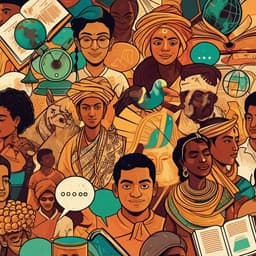
The Arts
Do artists perceive blockchain as a new revenue opportunity? A social representation study of the Korean music industry
Y. Park and S. Kim
Discover the intriguing insights from Yujun Park and Seongcheol Kim as they delve into Korean artists' mixed feelings about blockchain's transformative potential in the music industry. While the hope for innovative revenue streams through disintermediation and NFTs is palpable, the practical hurdles for immediate adoption can't be overlooked. Tune in to explore this significant research!
~3 min • Beginner • English
Introduction
Digitization ushered in a paradigm shift from physical sales to digital downloads and streaming, expanding access for consumers but creating opaque and unequal royalty distributions between artists and business actors. In Korea, business actors capture over 80% of streaming revenue while producers and performers receive less than 10%. While blockchain has been promoted as a potential solution via disintermediation and NFTs, critics question industry readiness, incumbent resistance, and technical transparency. There is limited empirical research on how artists realistically perceive such prospects. This study applies social representation theory (SRT) and interviews with Korean artists to examine their identities, perceptions, and understandings of new revenue opportunities from blockchain, aiming to inform sustainable adoption. The study poses two research questions: RQ1: How do artists perceive reconstruction of the royalty distribution system via blockchain? RQ2: How do artists perceive a new revenue channel through NFTs?
Literature Review
- Development of Korea’s digital music industry: Vertical integration by telecom conglomerates (SKT, KT, LG) accelerated digital music growth via platform ownership (MelOn, Genie, etc.), contrasting with Western, independent-led transitions (e.g., Napster, Spotify). This strengthened platform dominance and skewed revenue capture by business actors, potentially constraining artistic freedom.
- Critical values of streaming platforms: Large user pools, recommendation algorithms/playlists, and brand value (charts, partnerships) make platforms indispensable for discovery and promotion, reinforcing artist dependence.
- Royalty distribution: For a 7 won (~$0.0049) stream, copyright and neighboring-rights holders receive about 9.555% and 5.5625% respectively; production firms 38.6%, streaming services 35%, distributors 9.65%, KOMCA 0.945%, FKMP 0.6875%. Artists’ creative contribution is undervalued relative to business actors.
- Governmental revisions: Policy changes since 2003 have largely favored business actors. A 2019 increase in royalty income primarily benefited distributors and production firms; modest increases for producers and performers by 2021; 2023 in-app purchase exemptions protected streaming providers. Overall, business actors’ shares rose roughly 5% vs. <1.5% for artists.
- Blockchain’s promise: Decentralized, transparent, immutable ledgers and smart contracts could enable disintermediation—direct artist–consumer transactions and simplified rights management—potentially improving artist shares. Startups (e.g., Audius, Gala Music) exemplify attempts.
- NFT revenue channel: NFTs can monetize IP via verifiable ownership/rarity. However, market volatility (boom and sharp decline) and reliance on fandom suggest benefits skew to top-tier artists.
- Theoretical framework (SRT): SRT examines shared, commonsense knowledge within communities. Prior SRT studies mapped perceptions of fintech and blockchain (core: security, bitcoin, decentralization). This study uses SRT with core–periphery analysis to reveal artists’ shared perceptions.
- Prior blockchain–music research: Predominantly speculative or case-based, highlighting potential transparency and resistance from incumbents, and technical/verification concerns. This study addresses the empirical gap by eliciting artists’ lived perspectives and articulating RQs on disintermediation and NFTs.
Methodology
Design: Social Representation Theory (SRT) with core–periphery analysis and maximum tree visualization.
- Participants: 16 Korean music artists (mix of producers, performers, and singer-songwriters) predominantly outside the celebrity top 1%; all currently supplement income via part-time/other jobs to reflect majority artist experience. Years of professional activity ranged from 3 to 16.
- Recruitment: Author’s personal network and a posting on Mule (a musician-focused local online community). Informed consent obtained; interviews audio-recorded; confidentiality maintained.
- Data collection: Semi-structured interviews focusing on two blockchain-derived revenue opportunities: disintermediation of royalty distribution and NFT-based revenue.
- Coding and reliability: Open coding through iterative coder discussions yielded 13 agreed codes/topics. Inter-rater reliability was 92.2%.
- Analysis: Content analysis followed by core–periphery modeling (UCINET). Similarity analysis computed co-occurrence using Jaccard’s coefficient, transformed to an inter-attribute similarity (IAS) matrix. A maximum tree was generated by iteratively linking highest-salience associations until all topics formed one network, visualizing artists’ social representations.
Key Findings
- Thirteen topics captured artists’ social representations of blockchain’s opportunities and challenges. Core elements (highest coreness) were: Opportunity (T1, coreness 0.774), Infeasibility of disintermediation (T3, 0.466), and Expected benefits (T4, 0.345). Periphery topics included Little expectations (T5, 0.217), Movement by players (T10, 0.079), Ingrained sufferings (T12, 0.061), Unawareness & indifference (T9, 0.050), Protection of copyright (T8, 0.041), Solution for current system (T2, 0.032), Values for users (T7, 0.030), Values of current platforms (T6, 0.024), Intensification of polarization (T13, 0.011), and Prematurity of industry (T11, 0.008).
- Two dominant, contradictory perceptions emerged:
1) Optimism: Blockchain seen as an opportunity for fairer rewards, transparency, copyright protection, stability in creation, and promotional benefits (including through NFTs). Artists desire reconstruction of the distribution system and greater recognition of musical value.
2) Skepticism: Disintermediation perceived as impractical under entrenched platform dominance, incumbent interests, and regulatory history. Artists doubt meaningful income gains for most, expect benefits to concentrate among celebrities with strong fandoms, and see the NFT downturn and crypto associations as risks.
- Preconditions for feasibility: Need for active movement by influential players (major streaming platforms, government, celebrities), competitive user value (music catalog, usability, discovery, audience reach) in blockchain-based services, and maturation of the blockchain music infrastructure and user base.
- Barriers: Public unawareness/indifference to artists’ hardships and to blockchain’s distinct role beyond cryptocurrency; distrust of existing copyright institutions and opaque streaming data; industry prematurity.
- Artists’ pragmatism: Some would accept potential polarization intensifying if it yields even modest income increases for them.
Discussion
Findings address RQ1 by showing artists’ ambivalence toward blockchain-enabled disintermediation: while they want a rebalanced royalty system with transparent, direct transactions, they view true disintermediation as unlikely without incumbent cooperation and substantial user-value parity. The perceived infeasibility reflects entrenched platform advantages, historical policy biases, and opaque data practices. For RQ2, artists regard NFTs as a potential promotional and revenue tool but expect benefits to accrue primarily to artists with strong fandoms; volatility and crypto stigma dampen expectations. The social representation map clarifies that optimism (opportunities and expected benefits) coexists with skepticism (infeasibility, little expectations), moderated by prerequisites such as influential player participation, platform competitiveness for users, and broader public awareness.
Conclusion
The study contributes empirical evidence on artists’ perceptions of blockchain in Korea’s music industry, revealing a core ambivalence: hope for new opportunities (fairness, transparency, protection, stability) alongside skepticism about practical realization (disintermediation hurdles, industry immaturity, public indifference). Methodologically, SRT with core–periphery mapping elucidated shared cognitive structures among non-expert stakeholders.
Practical implications include: start-ups should partner with incumbents by delivering unmet needs via blockchain (e.g., transparent rights data, smart-contract tooling); influential players’ participation is pivotal to ecosystem transition; government support should be enabling yet minimal, leveraging deregulation and regulatory sandboxes; policy reform can draw on external precedents (e.g., US songwriter rate increases, Germany’s modernization for streaming transparency). Future research should broaden stakeholder coverage (platforms, labels, distributors, rights societies), compare cross-country contexts, and track evolving representations as technology and markets mature.
Limitations
- Context specificity: Findings derive from Korea’s vertically integrated, platform-dominated market and may not generalize to different industry structures or cultures.
- Single stakeholder focus: Only artists were interviewed; perspectives of business actors and rights institutions may differ.
- No longitudinal analysis: Perceptions may shift rapidly with technological and market changes (e.g., crypto/NFT cycles); dynamic tracking was beyond the study’s scope.
- Sample scope: 16 non-top-tier artists; while purposive and relevant, broader samples could enhance representativeness.
Related Publications
Explore these studies to deepen your understanding of the subject.







